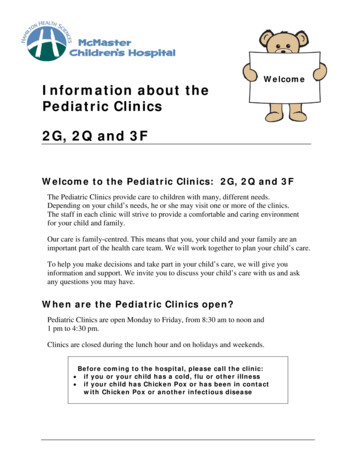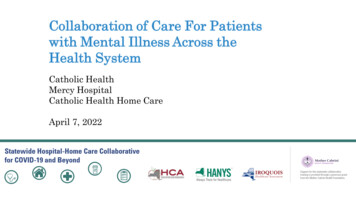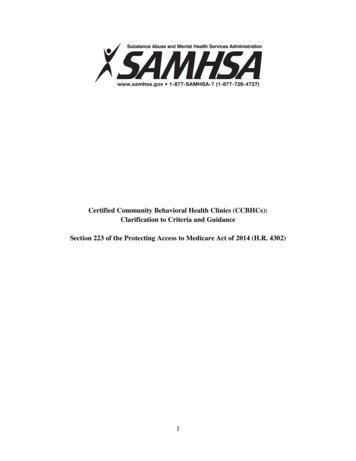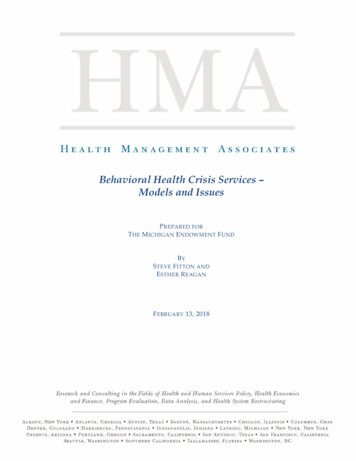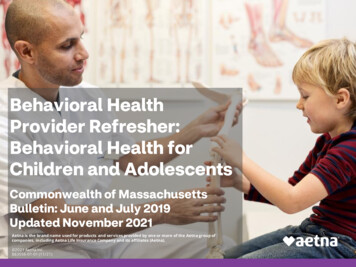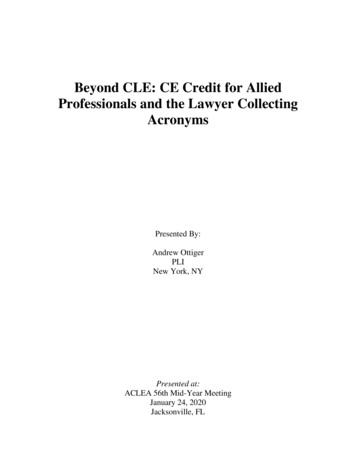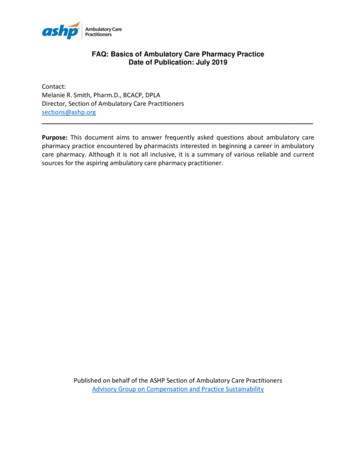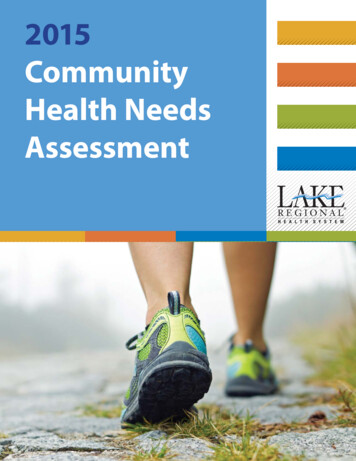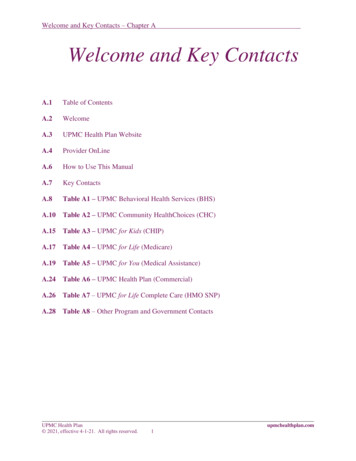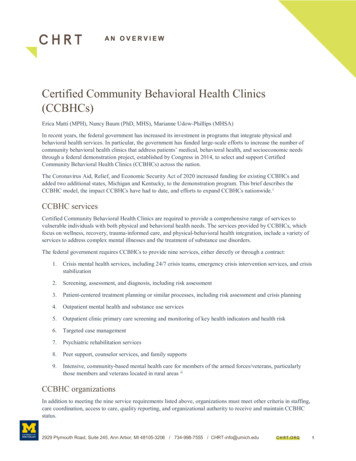
Transcription
AN OVERVIEWCertified Community Behavioral Health Clinics(CCBHCs)Erica Matti (MPH), Nancy Baum (PhD, MHS), Marianne Udow-Phillips (MHSA)In recent years, the federal government has increased its investment in programs that integrate physical andbehavioral health services. In particular, the government has funded large-scale efforts to increase the number ofcommunity behavioral health clinics that address patients’ medical, behavioral health, and socioeconomic needsthrough a federal demonstration project, established by Congress in 2014, to select and support CertifiedCommunity Behavioral Health Clinics (CCBHCs) across the nation.The Coronavirus Aid, Relief, and Economic Security Act of 2020 increased funding for existing CCBHCs andadded two additional states, Michigan and Kentucky, to the demonstration program. This brief describes theCCBHC model, the impact CCBHCs have had to date, and efforts to expand CCBHCs nationwide. iCCBHC servicesCertified Community Behavioral Health Clinics are required to provide a comprehensive range of services tovulnerable individuals with both physical and behavioral health needs. The services provided by CCBHCs, whichfocus on wellness, recovery, trauma-informed care, and physical-behavioral health integration, include a variety ofservices to address complex mental illnesses and the treatment of substance use disorders.The federal government requires CCBHCs to provide nine services, either directly or through a contract:1.Crisis mental health services, including 24/7 crisis teams, emergency crisis intervention services, and crisisstabilization2.Screening, assessment, and diagnosis, including risk assessment3.Patient-centered treatment planning or similar processes, including risk assessment and crisis planning4.Outpatient mental health and substance use services5.Outpatient clinic primary care screening and monitoring of key health indicators and health risk6.Targeted case management7.Psychiatric rehabilitation services8.Peer support, counselor services, and family supports9.Intensive, community-based mental health care for members of the armed forces/veterans, particularlythose members and veterans located in rural areas iiCCBHC organizationsIn addition to meeting the nine service requirements listed above, organizations must meet other criteria in staffing,care coordination, access to care, quality reporting, and organizational authority to receive and maintain CCBHCstatus.2929 Plymouth Road, Suite 245, Ann Arbor, MI 48105-3206 / 734-998-7555 / CHRT-info@umich.edu1
AN OVERVIEWCertified Community Behavioral Health ClinicsCCBHCs must be non-profit organizations or units of a local government behavioral health authority. Tribal healthorganizations and health centers may also become CCBHCs if they meet the criteria and are operated under theIndian Health Service or the authority of a tribe. iiiPrivate, for-profit clinics or organizations cannot become CCBHCs, but can enter into a formal agreement with aCCBHC to become a designated collaborating organization.Legislative history of CCBHCsSenator Debbie Stabenow (D-MI) introduced the bipartisan Excellence in Mental Health Act in 2009 to increasefederal and financial support for access to high quality care for those living with mental illness and addiction. ThisAct established the nine required services for CCBHCs. It also addressed how this care would be financed – mainly,that CCBHCs will be reimbursed based on provider costs. ivCCBHCs were created through Section 223 of the Protecting Access to Medicare Act of 2014, which established atwo-year, eight-state demonstration program based on the Excellence in Mental Health Act. vIn October 2015, twenty-four states (see Figure 1) were awarded planning grants to design CCBHC programs. InDecember 2016, the U.S. Substance Abuse and Mental Health Services Administration (SAMHSA) announced thateight states would participate in the demonstration program: Minnesota, Missouri, New Jersey, New York, Nevada,Oklahoma, Oregon, and Pennsylvania. 1 These states launched their CCBHC demonstrations in mid-2017 with 67CCBHC provider organizations in 372 locations across 190 counties. viFigure 124 states received CCBHC planning grants in 2015 viiMichigan applied to be a demonstration state in 2016, but was not selected by SAMHSA as part of the original eight-statedemonstration program.112
AN OVERVIEWCertified Community Behavioral Health ClinicsIn 2018, Congress appropriated funds for two-year CCBHC expansion grants to allow new sites to becomeCCBHCs, particularly sites that were not located in demonstration states. Sites located in Michigan were included aspart of the expansion and Michigan had the most clinics of any state that received funding through the expansiongrant program (see Figure 2). viiiFigure 2CCBHCs in Michigan before 2020 and added in 2020CCBHCs in Michigan before FY 2020New Michigan CCBHCs Awarded FY 2020CMH Authority of Clinton, Eaton, & Ingham CountiesLansing, MICommunity Network ServicesNovi, MIEaster Seals-Michigan, Inc.Auburn Hills, MIThe Guidance CenterSouthgate, MIIntegrated Services of KalamazooKalamazoo, MIHealthWestMuskegon, MISaint Clair County Community Mental HealthPort Huron, MIWashtenaw County Community Mental HealthYpsilanti, MIWest Michigan Community Mental Health SystemLudington, MICalhoun County Community Mental Health AuthorityBattle Creek, MIDetroit Recovery Project, Inc.Detroit, MIGenesee Health SystemFlint, MIHegira Programs, Inc.Livonia, MIJudson Center, Inc.Royal Oak, MIMacomb County Community Mental HealthClinton Township, MINetwork180Grand Rapids, MITeam Mental Health ServicesDearborn, MISaginaw County Community Mental Health AuthoritySaginaw, MI ixFigure 3Michigan counties served by a CCBHCThere are 18 CCBHCs in Michigan serving 18 of thestate’s 83 counties. At this time, there are no CertifiedCommunity Behavioral Health Clinics in NorthernMichigan or the Upper Peninsula.3
AN OVERVIEWCertified Community Behavioral Health ClinicsCARES Act CCBHC expansionThe Coronavirus Aid, Relief, and Economic Security (CARES) Act was signed into law on March 27, 2020 inresponse to the economic hardships states were facing as a result of the COVID-19 pandemic. This Act expandedthe CCBHC demonstration to two additional states for two full years, chosen from the group of original applicantsfor the program. xIn August 2020, the U.S. Centers for Medicare & Medicaid Services (CMS) and SAMSHA announced thatMichigan and Kentucky would join as demonstration states for a total of ten states participating in the CCBHCdemonstration program. xi These states are now both demonstration states and states with direct-to-site CCBHCexpansion grants. The rollout plans for Michigan’s statewide implementation are currently in development.In April 2020, SAMHSA announced 166 awards for CCBHC expansion grants. The expansion grants included 200million in annual funding for CCBHCs, in addition to the 250 million in emergency funding provided to CCBHCsunder the CARES Act. All funding was exclusively awarded to those organizations that had applied for CCBHCexpansion grant funding prior to the COVID-19 pandemic. With the expansion, there will be almost 230 CCBHCsorganizations operating in thirty-three states (see Figure 3). xiiFigure 4Status of participation in the CCBHC model xiiiPopulations Served by CCBHCsAlthough the CCBHC demonstration program is designed to work within the scope of state Medicaid plans and tospecifically service Medicaid enrollees, CCBHCs are not permitted to refuse service to any individual on the basisof ability to pay or place of residence. CCBHCs serve a wide array of populations, including many individuals withserious mental illness, serious emotional disturbance, mild to moderate mental illness, and substance use disorders,and those who are active-duty military and veterans, as well as individuals who are low-income, uninsured, or courtordered to receive services. xiv4
AN OVERVIEWCertified Community Behavioral Health ClinicsA survey of CCBHCs conducted by the National Council for Behavioral Health along with the University ofMichigan Behavioral Health Workforce Research Center found that populations served by CCBHCs are diverse. Allrespondent CCBHCs reported that their site serves individuals within the LGBTQ populations, and 94 percent ofCCBHCs responded that they serve racial minority populations. Another 19.4 percent of CCBHCs responded thatthey serve tribal populations, and 83.3 percent reported that they serve populations with language-based disabilitiesor individuals with Limited English Proficiency. xvFunding for CCBHCsThere are two different federal funding tracks for CCBHCs. CCBHCs in states participating in the demonstrationprogram receive an enhanced Medicaid reimbursement rate through a Prospective Payment System (PPS). xvi ThePPS methodology is also sometimes referred to as “cost-related reimbursement,” and although providers are notguaranteed to recover all costs associated with providing these specific services, the reimbursement rates areestablished by a base year cost report for each CCBHC that includes the cost of providing all services to all patientsin a clinic. This allows each CCBHC to set a unique rate for reimbursement commensurate with costs, and that samerate is paid, regardless of intensity of services. xviiStates were allowed to choose between two PPS methodologies developed by CMS. The first methodology (PPS-1) is similar to that used by Federally Qualified Health Centers—it is a cost-basedreimbursement that pays a fixed daily rate for all services rendered to a Medicaid beneficiary. The PPS-1methodology also lets states provide quality bonus payments to CCBHCs that meet defined quality metrics. The second methodology (PPS-2) is a cost-based reimbursement that pays a standard monthly rate per Medicaidbeneficiary served, with separate monthly rates that vary with beneficiaries' clinical conditions. Under the PPS2 methodology, states reimburse participating CCBHCs at a fixed monthly rate for all services provided to aMedicaid beneficiary. xviiiMichigan is currently in the planning phase of the CCBHC implementation and has not yet selected a paymentmethodology.The second funding track for CCBHCs is through federal grants, also known as CCBHC expansion grants awardedby SAMHSA. Each of the CCBHCs that were not part of the initial demonstration program are funded throughexpansion grants of up to 2 million per year for two years. This funding is not exclusively for new CCBHCsthough, as some sites that were a part of the initial demonstration program have also received expansion grants. xixImpact of CCBHCsCCBHCs have only been in effect a short time and data are not yet available to measure their impact on outcomes;however, positive process measures have been reported by the National Council for Behavioral Health, an advocacyorganization representing CCBHC clinics. These process improvements include: Training staff in suicide prevention. Reaching out to school-age youth and creating formal referral relationships with local schools. Increasing the number of CCBHCs offering medication-assisted treatment (MAT), the gold standard for opioidaddiction treatment. Reducing patient wait times and increasing the number of patients served.5
AN OVERVIEWCertified Community Behavioral Health Clinics Creating relationships with local law enforcement agencies, mental health and drug courts, and adult andjuvenile criminal justice agencies/courts. Expanding staff capacity and opportunities (CCBHCs added over 3,000 staff members in the first year alone).xxOngoing workforce challengesWorkforce shortages remain a concern in behavioral health, and the impact of CCBHC status on the workforce ofbehavioral health organizations is particularly significant. The increased funding provided to CCBHCs allows themto pay more competitive salaries and hire more qualified candidates.CCBHCs have been able to increase their workforce and improve staff retention, but onboarding many new staffmembers in a short amount of time presents challenges and recruiting staff continues to be difficult as the behavioralhealth field is experiencing a shortage nationwide. xxiConclusionThe CCBHC model offers the opportunity to improve behavioral health service delivery, and there is broadbipartisan support for the CCBHC model going forward. Both funding and support for CCBHCs increased in 2020,and eligibility for expansion grants was extended nationwide.Opportunities, funding, and support for CCBHCs continue to increase, and CCBHCs have become a promisingstructure for integrating and improving the behavioral health care delivery system nationwide. xxii6
AN OVERVIEWCertified Community Behavioral Health ClinicsBibliography7
AN OVERVIEWCertified Community Behavioral Health Clinics“Senator Stabenow Announces New Certified Community Behavioral Health Clinics in Lansing, Novi andSouthgate: U.S. Senator Debbie Stabenow of Michigan.” News Press U.S. Senator Debbie Stabenow of Michigan,September 28, 2018. tified Community Behavioral Health Clinic Success Center - CCBHC.” National Council, September 14,2020. d-community-behavioral-health-clinics/.ii“Who Can and Cannot Be a CCBHC?” SAMHSA. Accessed November 25, ion-resource-guides/ccbhc-eligibility.iii“CCBHC: Certified Community Behavioral Health Clinics. Are You Ready?” National Council for /wp-content/uploads/2015/11/Fact-Sheet AL.pdf?daf 375ateTbd56, 2015.ivv“Take Action.” National Council, October 16, 2020. ce-inmental-health-act/.“Michigan & Kentucky Now Participating In CCBHC Demonstration.” OPEN MINDS, September 17, ccbhcdemonstration/.vi“Certified Community Behavioral Health Clinics Demonstration Program. Report to Congress, 2017.” SAMHSA,August 10, 2018. https://www.samhsa.gov/sites/default/files/ccbh clinicdemonstrationprogram 081018.pdf.viiviii“Certified Community Behavioral Health Clinic Success Center - CCBHC.” National Council, September 14,2020. d-community-behavioral-health-clinics/.“Grants State Years.” SAMHSA. U.S. Department of Health and Human Services. Accessed November 25, /MI/discretionary/2020/details?page 0.ix“Information on the CARES Act for People with Mental Illness.” National Alliance on Mental Illness (NAMI).NAMI News, March 27, 2020. lness.xxiIBID, VI.xii“National Council Statement on Allocation of CARES Act Funding to CCBHCs.” National Council, May 4, ares-act-funding-toccbhcs/.“Take Action to Expand and Sustain CCBHCs.” The National Council for Behavioral Health, CCBHC SuccessCenter, October 16, 2020. enter/take-action/.xiii“Criteria for the Demonstration Program to Improve Community Mental Health Centers and to Establish CertifiedCommunity Behavioral Health Clinics.” programs campaigns/ccbhc-criteria.pdf.xivxvUniversity of Michigan Behavioral Health Workforce Research Center and the National Council for BehavioralHealth. Reaching the Quadruple Aim: Workforce and Service Delivery Within Certified Community BehavioralHealth Clinics. Ann Arbor, MI: UMSPH; August 2019. loads/2019/10/NC-CCBHC Full-Report.pdf8
AN OVERVIEWCertified Community Behavioral Health ClinicsRichardson, Jeff, and Charles Ingoglia. “What Is a CCBHC?” The National Council for Behavioral Health,October 2019. f 375ateTbd56.xvixviiIBID, XIV.“Certified Community Behavioral Health Clinics Demonstration Program: Report to Congress, 2019.” ASPE,Mathematica Policy Research and RAND Corporation, September 24, 2020. -report-congress-2019.xviiiFarley David, Rebecca, and Melissa Lewis-Stoner. “Webinar: The Future of CCBHCs: Opportunities forExpansion & Lessons Learned From the Field.” Relias, July 24, 2020. s-opportunities-forexpansion?aliId AweEl6RW9mNE9GeDFtZz09In0.xix“CCBHCs Expanding Mental Health and Addiction Treatment: An Impact Report.” The National Council forBehavioral Health, March 2020. ads/2020/03/2020-CCBHCImpact-Report.pdf?daf 375ateTbd56.xxElliott, Lauren. “NatCon20: COVID-19, Hiring and Onboarding, and CCBHCs.” Relias, April 8, -hiring-onboarding-ccbhcs.xxixxiiIBID, XIX.9
Port Huron, MI Network180 Grand Rapids, MI Washtenaw County Community Mental Health Ypsilanti, MI Team Mental Health Services Dearborn, MI West Michigan Community Mental Health System Ludington, MI Saginaw County Community Mental Health Authority Saginaw, MI. ix. Figure 3 Michigan counties served by a CCBHC . There are 18 CCBHCs in Michigan .
